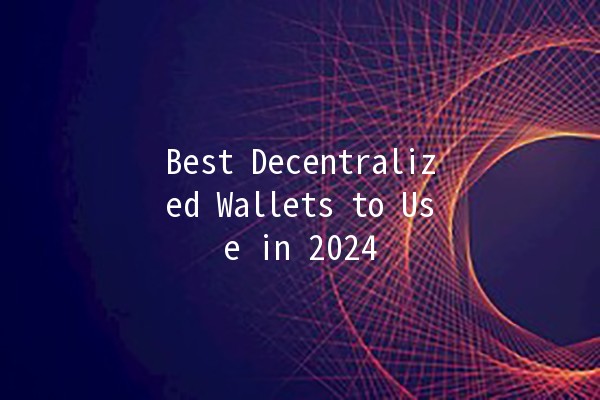




In the everevolving world of cryptocurrency, having a reliable wallet is essential for managing your digital assets securely and efficiently. As we step into 2024, the landscape of decentralized wallets continues to expand, offering users enhanced security features, userfriendly interfaces, and innovative functionalities. This article details the best decentralized wallets available in 2024, providing practical tips and insights into maximizing their potential. Additionally, we will explore techniques that can improve your productivity while navigating the world of decentralized finance (DeFi).

Decentralized wallets are digital wallets that allow users to store, send, and receive cryptocurrencies directly without the need for a centralized authority or intermediary. Unlike traditional wallets held by exchanges, decentralized wallets give users full control over their private keys, enhancing security and privacy. Here are several types of decentralized wallets:
Software Wallets: Installed on your device as apps, they offer convenience and often provide a userfriendly interface.
Hardware Wallets: Physical devices that store your cryptocurrency offline, providing an extra layer of security.
Web Wallets: Accessible through browserbased interfaces but still allow users to manage their own keys.
Overview: MetaMask remains a frontrunner among decentralized wallets, primarily catering to Ethereum and ERC20 tokens. It functions as a browser extension, making it easy to interact with various decentralized applications (dApps).
Key Features:
Userfriendly interface with seamless integration into browsers.
Supports multiple networks, including Ethereum, Binance Smart Chain, and Polygon.
Allows for token swaps directly within the wallet.
Productivity Tip: Use the portfolio tracking feature to monitor the performance of your tokens. This can save time and improve decisionmaking when trading or managing your assets.
Overview: Acquired by Binance, Trust Wallet supports a wide range of cryptocurrencies and offers a mobilefirst approach to wallet management. Its opensource nature allows developers to inspect its code and enhance security.
Key Features:
Builtin DEX for trading tokens without leaving the app.
Extensive support for different coins and tokens.
Staking options to earn rewards on supported assets.
Productivity Tip: Utilize the DApp browser to access and manage your cryptocurrency across various platforms quickly, centralizing your activities and reducing the need to switch between different apps.
Overview: Exodus is known for its stunning user interface and capability to support a wide range of cryptocurrencies. It is a desktop and mobile wallet that enables easy management of digital assets.
Key Features:
Integrated exchange feature for swapping cryptocurrencies.
Portfolio management tools to visualize your investments.
24/7 customer support for user inquiries.
Productivity Tip: Use the watchonly address feature to monitor external wallet balances without involving your private keys, streamlining your asset management process.
Overview: Argent stands out for its focus on user experience and security features. It provides a unique "social recovery" feature, allowing users to access their wallets without needing a private key.
Key Features:
Easy onboarding process with no seed phrase required.
Integration with multiple DeFi protocols and apps.
Lock functionality to protect funds with additional layers of security.
Productivity Tip: Set up notifications for transactions and price alerts to keep track of market movements without having to check the wallet consistently.
Overview: Atomic Wallet is a decentralized and noncustodial wallet that supports over 500 cryptocurrencies. Its atomic swap feature allows users to trade assets directly within the wallet.
Key Features:
Multicurrency support with instant exchanges.
Builtin staking for earning passive income.
Private key ownership ensures full control over funds.
Productivity Tip: Leverage the builtin staking feature to automatically earn rewards while you manage your investments, maximizing earnings with minimal effort.
Why: Adding an extra layer of security helps protect your assets from unauthorized access. Many wallets now offer 2FA as a standard feature.
Application: Whenever available, set up 2FA using an authenticator app rather than SMS for enhanced security.
Why: Keeping your wallet up to date ensures you benefit from the latest security features and bug fixes.
Application: Enable automatic updates in your wallet settings, or periodically check for updates manually to ensure you’re using the latest version.
Why: Having a backup ensures you don’t lose access to your funds in case of device failure or loss.
Application: Follow the instructions provided by your wallet for creating a backup and store it in a secure location, such as an encrypted USB drive.
Why: Strong passwords reduce the risk of unauthorized access.
Application: Utilize a password manager to generate and store complex passwords securely.
Why: Public networks can be less secure, making it easier for hackers to intercept your connection.
Application: Only access your wallet from a secure internet connection. Consider using a VPN for added security while online.
Hot wallets, like software wallets, are connected to the internet and are convenient for frequent transactions. Cold wallets, such as hardware wallets, are offline and provide better security for longterm storage.
Yes, decentralized wallets are generally safe to use if you follow best practices such as enabling 2FA, setting strong passwords, and backing up your wallet. Remember, however, that safety also depends on your knowledge and vigilance.
If you have a backup of your wallet's recovery phrase or key, you can restore access to your funds. However, losing these credentials may result in permanent loss of access.
While some decentralized wallets can have a learning curve, many options, like MetaMask and Trust Wallet, focus on userfriendly interfaces, making them accessible to beginners.
Not all decentralized wallets support every cryptocurrency. However, leading wallets like Trust Wallet and Exodus offer extensive multicoin support. Always check the wallet’s compatibility before storing your assets.
If you detect unauthorized transactions, immediately revoke relevant permissions for dApps, change your password, and consider transferring your assets to a more secure wallet.
Decentralized wallets provide a secure and efficient way to manage cryptocurrencies as we move into